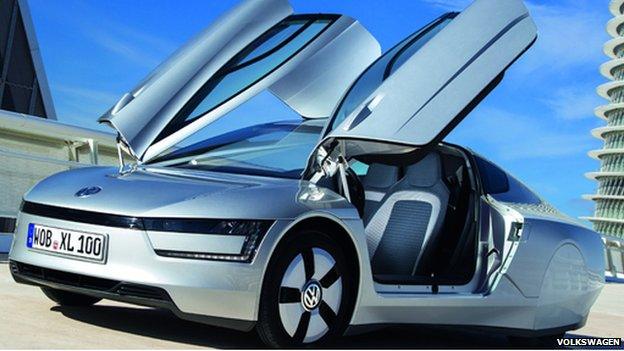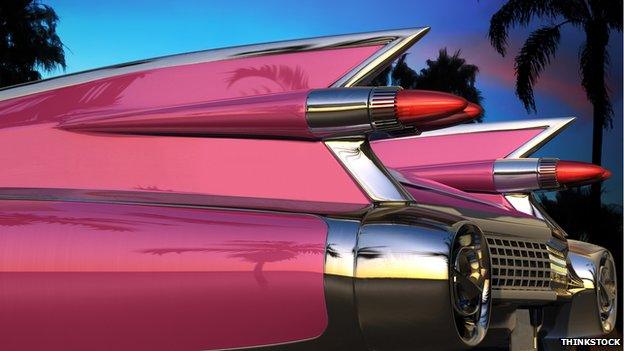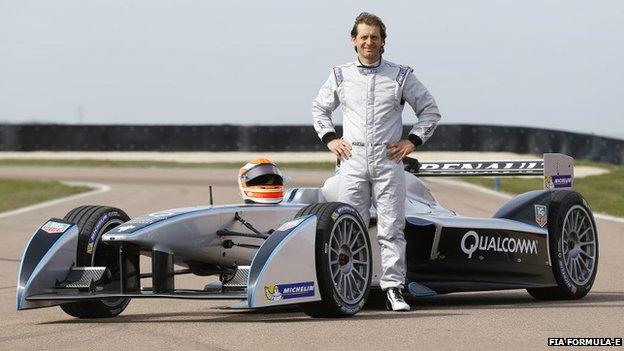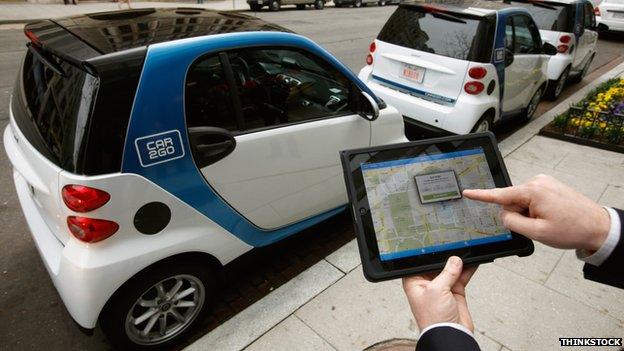Car technology driving more sustainable transport system
- Published

Volkswagen's XL1 hybrid diesel-electric car promises to deliver more than 300mpg
The motor car - and our relationship with it - is changing.
Technology is enabling improvements in production and fuel efficiency, but also encouraging us to drive more sustainably and change the way we use and think about the car.
Our passion for autonomous mobility has seen global car production rise remorselessly from 38 million in 1997 to more than 65 million in 2013, according to the International Organisation of Motor Vehicle Manufacturers (OICA), with all the pollution, climate change and health implications that has entailed.
While European production may have stagnated, emerging markets such as China and India are booming, as newly affluent middle-classes embrace the car as a symbol of material success.
Worldwide, there are now more than 830 million cars on the road, forcing governments to impose more stringent pollution emission standards on new cars.
In the European Union (EU), where road transport contributes about a fifth of total carbon dioxide emissions, new cars sold in 2013 already met the European Commission's (EC) 2015 CO2 emissions target of 130g per kilometre (g/km) on average, says the European Environment Agency.
But the EC wants this target to fall to 95g/km of CO2 by 2021, and the UK government's target is for all vehicles to be "ultra low emission" - defined as producing less than 75g/km - by 2040.
Internal combustion
The fact that car manufacturers are achieving these targets suggests the internal combustion engine is far from dead yet, despite the push towards electric vehicles.
"Twenty years ago the Ford Mondeo had a two litre engine, but our new Mondeo coming out later this year will have a one litre engine that is more powerful than the original in terms of brake horse power and torque, yet does 67 miles per gallon compared to 47," Ford spokesman Paul Wilson told the BBC.
The company has achieved this by dropping from four to three cylinders and adopting new technologies, such as variable valve timing, direct fuel injection, and a split cooling system that allows the engine to warm up more quickly, making it more efficient, says Mr Wilson.

The era of the huge gas-guzzling automobile - symbol of freedom and wealth - is well and truly over
The £60bn-a-year UK industry has also managed to reduce the energy used in production by 382 gigawatt hours (Gwh) in 2012, says the Society of Motor Manufacturers and Traders (SMMT), saving nearly 180,000 tonnes of CO2.
But such efficiency improvements will be cancelled out if the total number of internal combustion engine cars on the road keeps rising, as the figures suggest.
This is why there is such drive towards the electrification of vehicles, but also towards more sustainable ways of using cars.
Electric wheels
Electrified cars, ranging from pure plug-in battery-powered ones to hybrids - conventional cars with some element of electric power incorporated - are certainly becoming more common, led by Toyota's Prius and a growing number of other manufacturers entering the market.
But the take-up of plug-in vehicles - just 3,500 registrations in 2013 - is being hampered by the perception they don't have sufficient range and that there aren't enough charging points installed.
"These are myths," says SMMT spokesman Keith Lewis. "There are already 6,500 charge points available and more in London than there are petrol stations.

Former F1 driver Jarno Trulli test drove the new all-electric Formula E racing car in March
"The government is investing £40m in rapid charging networks and an extra £500m to help develop ultra-low emissions vehicles," he adds.
Concerns about lack of range are misplaced, he argues, given that "most people drive less than 30 miles a day".
Drivers can also receive up to £1,000 from the government to have a charging point installed at home, and save on road tax and congestion charges, he says.
Not surprisingly, the convenience of hybrids is boosting their popularity - about 30,000 new registrations in 2013 - but this is still just 1% of all UK cars on the road.
Good driver?
So what technologies can accelerate the take-up of more sustainable driving while we wait for ultra-low emission cars to go mainstream?
Many observers think the incorporation of telematics - the recording and transmission of speed, location, distance, acceleration and braking data either via "black boxes" hard-wired in to the car, or via GPS-enabled smartphone apps - will have a profound effect.
The insurance industry is already making increased use of the technology to reduce insurance premiums for younger, riskier drivers, and move towards a pay-as-you-go model, giving drivers a financial incentive to use the car less.
Commercial fleet operators already rely on it to reduce accident, fuel and maintenance costs.
Andy Cozens, director of sales at GreenRoad, a telematics company focusing on modifying driver behaviour, says: "Pretty much every driver drives in a sub-optimal manner because we love speed, we're always in a hurry, and we think we're better drivers than we really are."
By giving real-time feedback to drivers using a simple system of green, amber, and red lights on the dashboard, then assigning a score for the journey afterwards, the system encourages drivers to be less aggressive and to anticipate road conditions better.
"It's about changing our perceptions of what good driving is and turning it almost in to a game," says Mr Cozens.
Drivers can see the entire journey on a map and precisely identify places where they turned a corner too fast, for example, or accelerated too hard.
GreenRoad claims its customers see crash-related costs fall by up to 70% and fuel consumption fall 6% to 15%, meaning that the system pays for itself within three months.
All these savings help reduce CO2 emissions.
Smart cars
Perhaps the biggest behavioural change is being facilitated by GPS-equipped smartphones that have enabled service providers to match up registered users with cars and cabs in just a few taps on a screen.
Self-drive car sharing services like Zipcar, Car2go, and DriveNow, are encouraging urbanites to think of the car as a utility rather than a status symbol, says Dr Rainer Mehl of IT company NTT Data.

With services like Car2go, drivers can locate and book hire cars via smartphone and tablet
"It's now more about mobility than ownership," he says. "It makes no sense to own a car in a crowded city."
Meanwhile, services like Uber, Hailo, GetTaxi and Kabbee are making cab-ordering simpler and more convenient, also making car ownership less compelling.
But some observers believe the real sustainable revolution will come with the arrival of the autonomous car - incapable of breaking the speed limit, less likely to crash thanks to car-to-car wireless communication, and programmed for optimum fuel efficiency.
"Autonomous driving has huge sustainability potential because vehicles driving at the same slower speeds and quite close to each other will reduce fuel costs and maximise road space," says Martin Bayntun, spokesman for Volvo, a strong developer of the technology.
ABI Research forecasts that one-third of all vehicles will be completely driverless by 2032 - assuming we can cope with idea of not being in control.